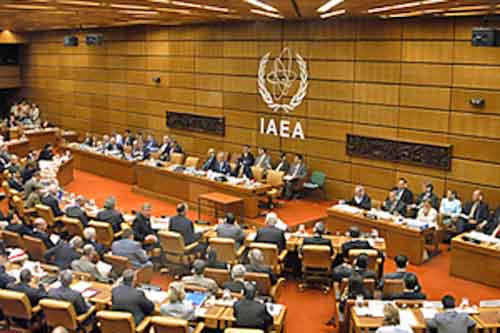“Piping water into the sea is an outrage,” said one Japanese fisher angered by the plan to release radioactive wastewater into the ocean. “The sea is not a garbage dump.”
Critics of a Japanese plan to release filtered radioactive wastewater from the Fukushima nuclear disaster into the Pacific Ocean intensified their opposition to the proposal on Wednesday after the United Nations agency responsible for promoting nuclear energy said the company that operated the plant has adequately demonstrated its ability to measure the water’s radioactivity.
The U.N.’s International Atomic Energy Agency (IAEA) this week released a report that found the Tokyo Electric Power Company (TEPCO)—the operator of the Fukushima Daiichi Nuclear Power Station that was catastrophically damaged during a 2011 meltdown in three reactors caused by an earthquake and tsunami—”has demonstrated its capabilities for accurate and precise measurements of the radionuclides present in the treated water stored on site.”
While proponents of the Japanese government’s 2021 proposal to gradually release more than 1 million metric tons of filtered Fukushima wastewater into the Pacific view the IAEA’s latest findings as a milestone on the road toward realizing the plan, opponents renewed their calls to keep the radioactive water out of the ocean.
“It’s applying a 19th-century ‘dilution is the solution to pollution’ approach to a problem that really should be dealt with in a much more modern way.”
“Piping water into the sea is an outrage. The sea is not a garbage dump,” 71-year-old Haruo Ono, who has been fishing off the coast of Fukushima his entire life, toldCBS News. “The company says it’s safe, but the consequences could catch up with us 50 years down the road.”
Kinzaburo Shiga, a 77-year-old, third-generation fisher from Fukushima, told CNN the government’s plan makes his “blood boil.”
“I know that the government has decided to go ahead with the policy of releasing treated wastewater into the sea, but for us fishers, it really feels like they made this decision without our full consent,” he said.
12 years after the Fukushima nuclear disaster, Japan is set to gradually release tons of filtered wastewater from the nuclear plant.@MarcReporting speaks to fishermen who fear that the move will undermine consumer confidence in their catches.
Read more: https://t.co/07TCL0lmMs pic.twitter.com/HsGtcZmqfC
— CNN International PR (@cnnipr) April 19, 2023
Fears of radioactive contamination from the planned wastewater release have prompted protests from the governments of China, South Korea, some Pacific island nations, and international environmental groups like Greenpeace, which argues the proposal violates international law.
“Continuing with ocean discharge plans at this time is simply inconceivable,” Henry Puna, secretary general of the Pacific Islands Forum intergovernmental group, wrote earlier this year. “I fear that, if left unchecked, the region will once again be headed towards a major nuclear contamination disaster at the hands of others.”
Lee Jae-myung, a South Korean opposition lawmaker from the centrist Democratic Party, said earlier this month that “Japan is putting forward claims that the contaminated water from the Fukushima nuclear power plant, if treated, is safe enough to drink.”
“If it is safe enough to drink, they should use it as drinking water,” he added.
Last week, a team of 21 South Korean nuclear experts visited the Fukushima site to inspect equipment and facilities that would be used during the proposed wastewater release.
S. Korea’s Fukushima inspection team says “further analysis” needed to verify wastewater’s safetyhttps://t.co/kfnhWunNhG #Fukushima_inspection #Fukushima_nuclear_power_plant #YooGukhee #radioactive_water #유국희 #후쿠시마_원자력발전소 #오염수시찰단 #Arirang_News #아리랑뉴스
— Arirang News (@arirangtvnews) May 31, 2023
Pages: 1 2



